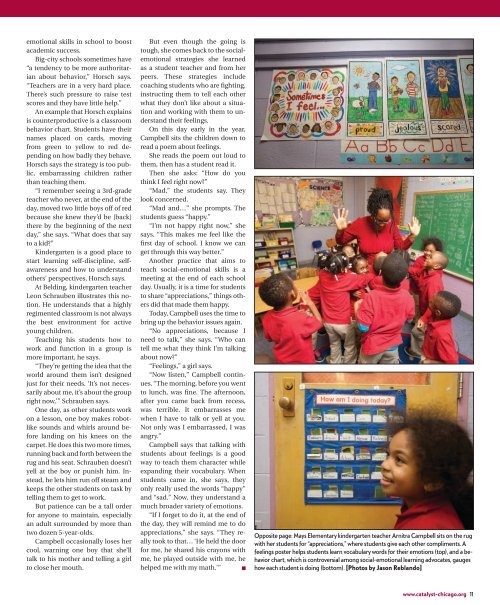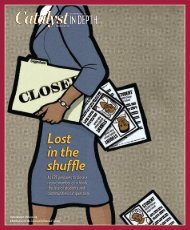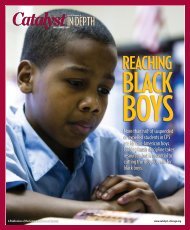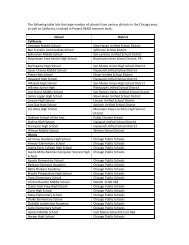The ABCs of kindergarten - catalyst-chicago.org
The ABCs of kindergarten - catalyst-chicago.org
The ABCs of kindergarten - catalyst-chicago.org
You also want an ePaper? Increase the reach of your titles
YUMPU automatically turns print PDFs into web optimized ePapers that Google loves.
emotional skills in school to boost<br />
academic success.<br />
Big-city schools sometimes have<br />
“a tendency to be more authoritarian<br />
about behavior,” Horsch says.<br />
“Teachers are in a very hard place.<br />
<strong>The</strong>re’s such pressure to raise test<br />
scores and they have little help.”<br />
An example that Horsch explains<br />
is counterproductive is a classroom<br />
behavior chart. Students have their<br />
names placed on cards, moving<br />
from green to yellow to red depending<br />
on how badly they behave.<br />
Horsch says the strategy is too public,<br />
embarrassing children rather<br />
than teaching them.<br />
“I remember seeing a 3rd-grade<br />
teacher who never, at the end <strong>of</strong> the<br />
day, moved two little boys <strong>of</strong>f <strong>of</strong> red<br />
because she knew they’d be [back]<br />
there by the beginning <strong>of</strong> the next<br />
day,” she says. “What does that say<br />
to a kid?”<br />
Kindergarten is a good place to<br />
start learning self-discipline, selfawareness<br />
and how to understand<br />
others’ perspectives, Horsch says.<br />
At Belding, <strong>kindergarten</strong> teacher<br />
Leon Schrauben illustrates this notion.<br />
He understands that a highly<br />
regimented classroom is not always<br />
the best environment for active<br />
young children.<br />
Teaching his students how to<br />
work and function in a group is<br />
more important, he says.<br />
“<strong>The</strong>y’re getting the idea that the<br />
world around them isn’t designed<br />
just for their needs. ‘It’s not necessarily<br />
about me, it’s about the group<br />
right now,’” Schrauben says.<br />
One day, as other students work<br />
on a lesson, one boy makes robotlike<br />
sounds and whirls around before<br />
landing on his knees on the<br />
carpet. He does this two more times,<br />
running back and forth between the<br />
rug and his seat. Schrauben doesn’t<br />
yell at the boy or punish him. Instead,<br />
he lets him run <strong>of</strong>f steam and<br />
keeps the other students on task by<br />
telling them to get to work.<br />
But patience can be a tall order<br />
for anyone to maintain, especially<br />
an adult surrounded by more than<br />
two dozen 5-year-olds.<br />
Campbell occasionally loses her<br />
cool, warning one boy that she’ll<br />
talk to his mother and telling a girl<br />
to close her mouth.<br />
But even though the going is<br />
tough, she comes back to the socialemotional<br />
strategies she learned<br />
as a student teacher and from her<br />
peers. <strong>The</strong>se strategies include<br />
coaching students who are fighting,<br />
instructing them to tell each other<br />
what they don’t like about a situation<br />
and working with them to understand<br />
their feelings.<br />
On this day early in the year,<br />
Campbell sits the children down to<br />
read a poem about feelings.<br />
She reads the poem out loud to<br />
them, then has a student read it.<br />
<strong>The</strong>n she asks: “How do you<br />
think I feel right now?”<br />
“Mad,” the students say. <strong>The</strong>y<br />
look concerned.<br />
“Mad and…” she prompts. <strong>The</strong><br />
students guess “happy.”<br />
“I’m not happy right now,” she<br />
says. “This makes me feel like the<br />
first day <strong>of</strong> school. I know we can<br />
get through this way better.”<br />
Another practice that aims to<br />
teach social-emotional skills is a<br />
meeting at the end <strong>of</strong> each school<br />
day. Usually, it is a time for students<br />
to share “appreciations,” things others<br />
did that made them happy.<br />
Today, Campbell uses the time to<br />
bring up the behavior issues again.<br />
“No appreciations, because I<br />
need to talk,” she says. “Who can<br />
tell me what they think I’m talking<br />
about now?”<br />
“Feelings,” a girl says.<br />
“Now listen,” Campbell continues.<br />
“<strong>The</strong> morning, before you went<br />
to lunch, was fine. <strong>The</strong> afternoon,<br />
after you came back from recess,<br />
was terrible. It embarrasses me<br />
when I have to talk or yell at you.<br />
Not only was I embarrassed, I was<br />
angry.”<br />
Campbell says that talking with<br />
students about feelings is a good<br />
way to teach them character while<br />
expanding their vocabulary. When<br />
students came in, she says, they<br />
only really used the words “happy”<br />
and “sad.” Now, they understand a<br />
much broader variety <strong>of</strong> emotions.<br />
“If I f<strong>org</strong>et to do it, at the end <strong>of</strong><br />
the day, they will remind me to do<br />
appreciations,” she says. “<strong>The</strong>y really<br />
took to that… ‘He held the door<br />
for me, he shared his crayons with<br />
me, he played outside with me, he<br />
helped me with my math.’”<br />
Opposite page: Mays Elementary <strong>kindergarten</strong> teacher Arnitra Campbell sits on the rug<br />
with her students for “appreciations,” where students give each other compliments. A<br />
feelings poster helps students learn vocabulary words for their emotions (top), and a behavior<br />
chart, which is controversial among social-emotional learning advocates, gauges<br />
how each student is doing (bottom). [Photos by Jason Reblando]<br />
www.<strong>catalyst</strong>-<strong>chicago</strong>.<strong>org</strong> 11









